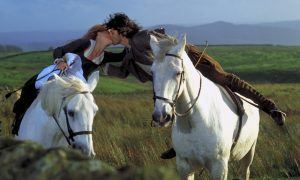Kathryn Hughes in The Guardian:
 Over this ecstatic high summer, visitors to the Haworth parsonage museum will be able to watch a film that simulates the bird’s-eye view of Emily Brontë’s pet hawk, Nero, as he swoops over the moors to Top Withens, the ruined farmhouse that is the putative model for Wuthering Heights. You’ll be able to listen to the Unthanks, the quavery Northumbrian folk music sisters who have composed music in celebration of Emily’s 200th anniversary. If that’s not enough, you can watch a video installation by Lily Cole, the model-turned-actor-turned-Cambridge-double-first from Devon, which riffs on Heathcliff’s origins as a Liverpool foundling. Finally, Kate Bush, from Kent, has been busy on the moors unveiling a stone. In short, wherever you come from and whoever you are, you will find an Emily Brontë who is sufficiently formless yet endlessly adaptive to whatever you need her to be – a rock, a song, a bird in flight.
Over this ecstatic high summer, visitors to the Haworth parsonage museum will be able to watch a film that simulates the bird’s-eye view of Emily Brontë’s pet hawk, Nero, as he swoops over the moors to Top Withens, the ruined farmhouse that is the putative model for Wuthering Heights. You’ll be able to listen to the Unthanks, the quavery Northumbrian folk music sisters who have composed music in celebration of Emily’s 200th anniversary. If that’s not enough, you can watch a video installation by Lily Cole, the model-turned-actor-turned-Cambridge-double-first from Devon, which riffs on Heathcliff’s origins as a Liverpool foundling. Finally, Kate Bush, from Kent, has been busy on the moors unveiling a stone. In short, wherever you come from and whoever you are, you will find an Emily Brontë who is sufficiently formless yet endlessly adaptive to whatever you need her to be – a rock, a song, a bird in flight.
That’s assuming, of course, that you are female. Nearly all the activities mentioned in connection with the forthcoming anniversary of her birth on 30 July involve women as makers, demonstrators, celebrators and educators. Likewise, nearly all Emily Brontë’s biographers and scholars over the past century have been women. If you do spot a man in the mix, chances are that he has been shuffled off to the side, rather like Branwell Brontë, though hopefully without the urge to get drunk and set fire to himself. The only other author who has become the object of such an intense female pash in the last 200 years is Sylvia Plath, who happens to be buried less than 10 miles away from Haworth at Heptonstall. The parallels are uncanny. Separated by a century, both Brontë and Plath were poets who remain most famous for writing a single intensely autobiographical novel. There’s even a pleasing bit of intertextuality in the way that in 1956 Sylvia Plath actually managed to marry Heathcliff in the form of her own glowering man-of-the-moors, Ted Hughes. Together the newlyweds tramped up to Top Withins and wrote poems about it, an event that Hughes was still mulling over 40 years later in his valedictory Birthday Letters. Both Plath and Brontë died at the age of 30 and then only gradually started to attract the cult-like devotion of female fans, who responded rapturously to their heroines’ status as exiles from the twin kingdoms of heteronormative happiness and literary fame.
More here.
